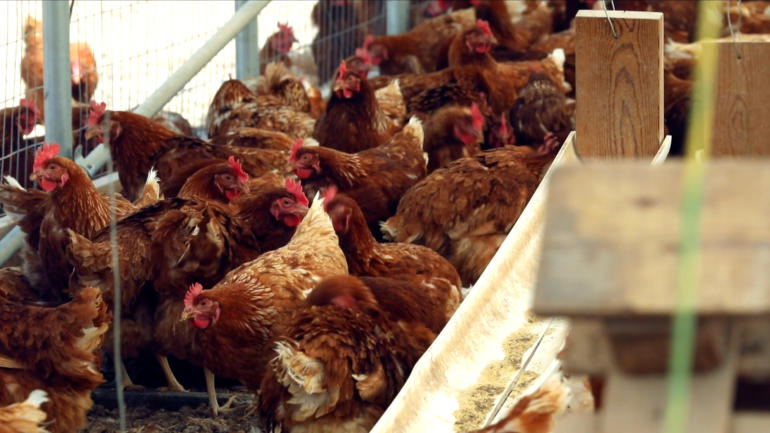Aaron Rice raises three-thousand chickens for eggs and for meat. He says his free range and pasture-based growing methods.
His birds deliver 25-hundred eggs each day during high season in the springtime. While his Northern Colorado operation is relatively small.
It is potentially vulnerable to disease.
“The way that we raise chickens though there’s really not much we can do in terms of separating wildlife from our domesticated flocks,” he said.
It’s that interaction that’s led to the current avian flu outbreak, which has swept through commercial and backyard flocks across the U.S..
“You know it seems to be spreading at a pretty high rate amongst birds,” says Sheryl Zajdowicz a biologist from Metropolitan State University of Denver.
Zajdowicz says the virus is transmitted through fecal droppings, saliva and nasal secretions. And larger facilities where chickens are packed together are not the only targets.
“All it takes is one migrating bird that might have symptoms that could potentially result in some transmission and then your smaller farms might also be impacted. This is one that can be quite devastating.”
The risk to humans of contracting this virus is extremely small. But the outbreak has impacted consumers through the increased price of eggs.
Grocery costs have gone up across the board lately.
“My eggs are a dollar more as well. So, everything’s going up at least a dollar, which, you know, adds up,” says a shopper.
It’s another example of so-called cost-push inflation which has permeated the U.S. economy.
“And by cost push we mean it is created by an increased cost of production for many products,” says Kishore Kulkarni an Economics professor at MSU Denver.
Rice says the costs of feed and other aspects of production have gone up sharply.
“Feed prices for not just egg production but also for meat production, pigs, chicken, yeah, it’s gonna start showing up in the grocery stores like essentially now.”
Millions of chickens, infected or not, have been destroyed already in the U.S. in an effort to contain the avian flu spread, cutting egg supply and raising prices further. Larger operations have taken extensive biosecurity steps to protect their flocks. Rice is getting chicks from approved sources and limiting visitors.
Rice says, “If we were to contract it out here we have to get rid of every chicken that’s on this farm. It would absolutely be very difficult to recover from. It’s not something we want to have to go through.”
Until then, it’s business as usual during this volatile time.
U.S. egg costs rise amid bird flu outbreak
World Today
 U.S. eggs costs rise amid bird flu outbreak
U.S. eggs costs rise amid bird flu outbreak
 CGTN America
CGTN America
